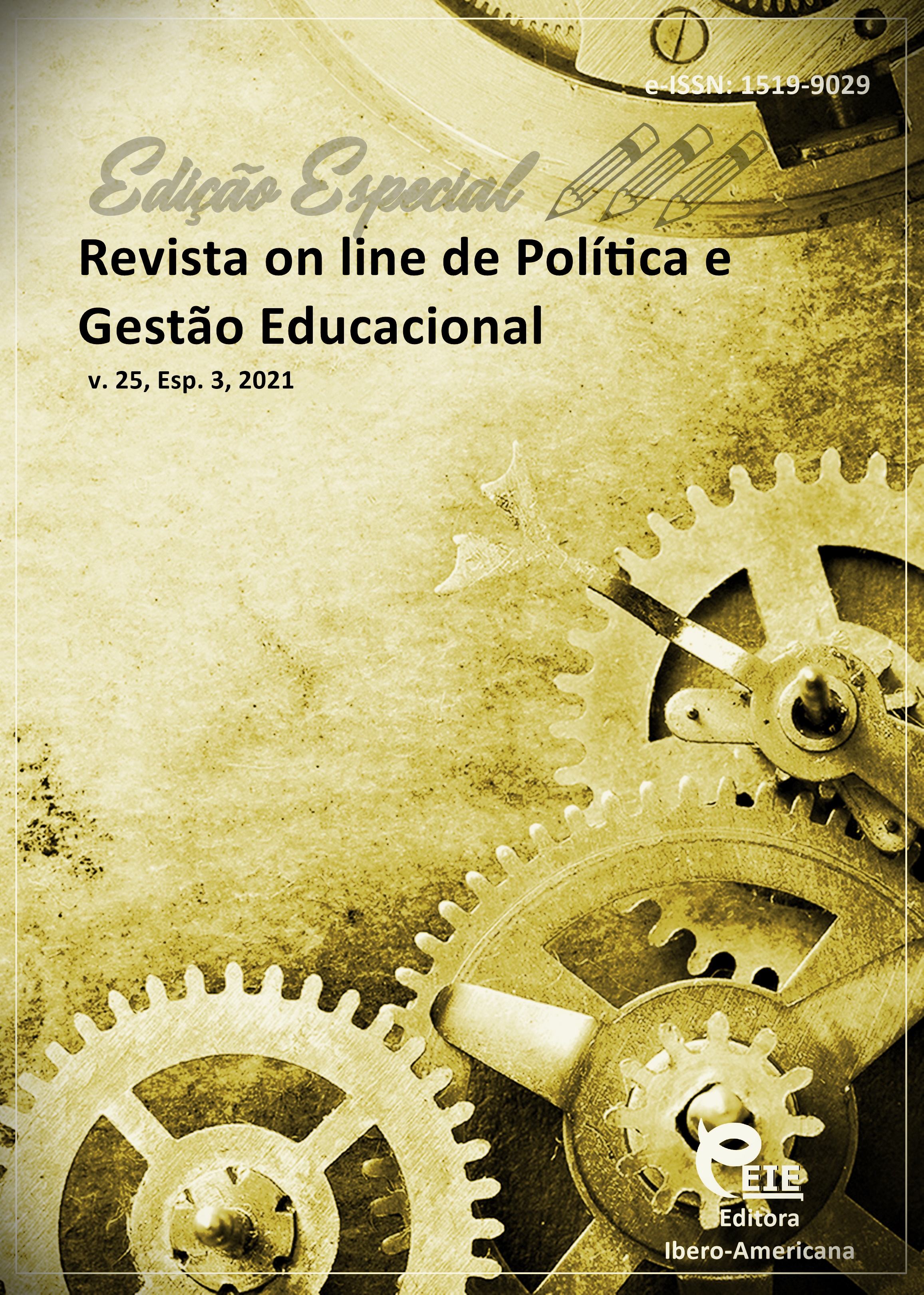Questões da formação de professores de arte no contexto das inovações educacionais
DOI:
https://doi.org/10.22633/rpge.v25iesp.3.15592Palavras-chave:
Professor, Educação, Empatia artística, Cultura de estilo, Autoeficácia no desempenhoResumo
O objetivo do trabalho é determinar as qualidades pessoais de um professor de música que contribuem para a eficácia de suas atividades artísticas e educacionais nas condições modernas, o desenvolvimento teórico da essência, conteúdo e estrutura de componentes das categorias “empatia artística”, “cultura de estilo de execução de obras musicais”, “autoeficácia artística e performática do indivíduo”. Usando os métodos de questionamento, teste, observação pedagógica e análise das aulas no sistema das faculdades de artes das universidades pedagógicas da Ucrânia e processamento estatístico dos materiais obtidos, o estado da prática moderna de formação profissional de futuros músicos é caracterizado. Como resultado do estudo, argumenta-se que essas qualidades estão entre as qualidades profissionais e pessoais dominantes de um professor de música moderno. O artigo confirma as perspectivas de formação dessas qualidades profissionais e pessoais justamente no processo de formação musical especial dos alunos.
Downloads
Referências
DENSITY, H.A. Axiological aspects of domestic education as a factor in the formation of professional and value orientations of the future teacher. Kaluga. 2004.
DIKUN, I. The content and structural characteristics of future Music teachers’ creative activity experience. Intellectual Archive, 1(6), 51-58. Toronto (Canada): Shiny Word.Corp. 2017.
DUBOVY, Z.S. Specifics of distance learning of future music teachers. Methodical practice: a journal for teaching and learning. Belgrade: Faculty of Teacher Education in Vranje and “School Book” DOO in Belgrade, 1,125-129. 2019.
GAO RUOJUN. Forming the ability to self-control - an important factor 0f improving the piano teaching and performance of future music teachers. Intellectual Archive, 3(7), 116-127. 2018. Toronto: ShinyWord.Corp. (Canada).
GUSACHENKO, O. Valorificarea strategiilor inovaționale de dezvoltare a învățământului artistic contemporan″, conferinţă ştiinţifico-practică internaţională. Bălți, 116-122. 2018.
HUANG CHANGHAO. Current trends in the development of vocal education future music teachers. 2017.
HUANG HANJIE. Musical-scenic partnership in the training of music teachers. The modern system of art education: formation, development, innovation. Astana: KazNUI. 2017.
KHOMICH, I.M. The structure of the readiness of future teachers of art disciplines to work with the choir. Yearbook of the Pedagogical Faculty in Vranje. Cataloging in the publication of the National Library of Serbia, Belgrade. 2016.
LIANG, H. A component structure of readiness of future music masters is to vocally-choral work with application of project technologies. KELM Scientific issue of knowledge, education, law and management. Wydawca: Fundacja «Oświata і Nauka Bez Granic PRO FUTURO», 2(18), 84-93. Łódź. 2017.
MALASHEVSKA, I. The Main Principles of Music Education of Preschool and Junior School Age Children during Music Therapy Training. Znajduje się wmonografii pt. Dobro i zło w wychowaniu dziecka. Kraków, 27-31. 2017.
PROVOROVA, E.M. Preparation of the future music teacher for lesson design: praxeological approach. Scientific journal “ScienceRise” Pedagogical education, 10/5 (15), 49-53. 2015.
PUHALSKY, T.D. Diagnosis and analysis of the levels of professional competence of future teachers by means of conducting and choral disciplines. Proceedings from international scientific conference: advances of science. Czech Republic, Karlovy Vary. 2018.
SHPITSA, R.I. Innovations in the integrated Music lesson: educational call of modern realias in comprehensive schools. Science and рractice: Collection of scientific articles. Thorpe Bowker. Melbourne, Australia, 307-310. 2016. Available: http://enpuir.npu.edu.ua/handle/123456789/11880
SMIRNOV, S.D. Pedagogy and psychology of higher education: from activity to personality: textbook. manual for students of higher educational institutions. Moscow: Publishing Center “Academy”. 2001.
STRATAN-ARTYSHKOVA, T.B. Creative and performing training of future music teachers. Monograph. Kirovograd: KSPU named after V. Vinnichenko. 2014.
STROHAL, T. YR. Methodical basis of using innovative art therapeutic technologies in the process of teenagers’ emotional and aesthetic experience formation. Intellectual Archive, 1 (6), 89-101. Toronto. 2010.
SUN, P. Semiotic art interpretation skill in music teacher’s training process (pedagogical principles). The Scientific Heritage, 15, 41-47. Budapest, Hungary. 2017.
TSYUMAN, T.P. Code of safe educational environment. Kyiv: Ukrainian Foundation for the Welfare of Children. 2018.
WANG, K. Formation of heuristic thinking of future teachers of music art and its results. EUROPEAN HUMANITIES STUDIES: europejskie stydia humanistyczne: Psychological, pedagogical and organizational conditions for the introduction of European standards of higher education: State and Society. Slupsk, Poland, 1, 51-61. 2016.
ZAITSEVA, A.V. Artistic and communicative culture of the future teacher of music: theory, methodology, methodological aspects: monograph. Kyiv: M.P. Drahomanov National Pedagogical University. 2017a.
ZAITSEVA, A.V. Methodical recommendations “Pedagogical guidance of the process of formation of artistic and communicative culture of the future music teacher”. Kyiv: M.P. Drahomanov National Pedagogical University. 2017b.
ZHUITIN, L. Component structure of formation of musical and aesthetic taste of teenagers. Science and Education a New Dimension. Pedagogy and Psychology, VI (68), 51–55. 2018.
Downloads
Publicado
Como Citar
Edição
Seção
Licença
Copyright (c) 2021 Revista on line de Política e Gestão Educacional

Este trabalho está licenciado sob uma licença Creative Commons Attribution-NonCommercial-ShareAlike 4.0 International License.
Manuscritos aceitos e publicados são de propriedade da Revista on line de Política e Gestão Educacional. É vedada a submissão integral ou parcial do manuscrito a qualquer outro periódico. A responsabilidade do conteúdo dos artigos é exclusiva dos autores. É vedada a tradução para outro idioma sem a autorização escrita do Editor ouvida a Comissão Editorial Científica.











